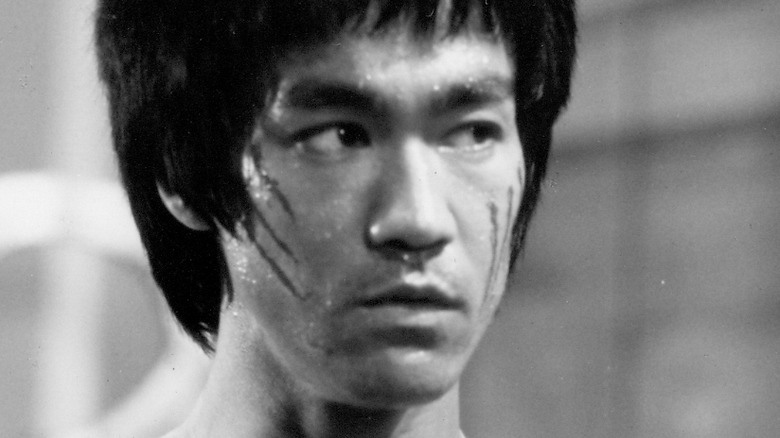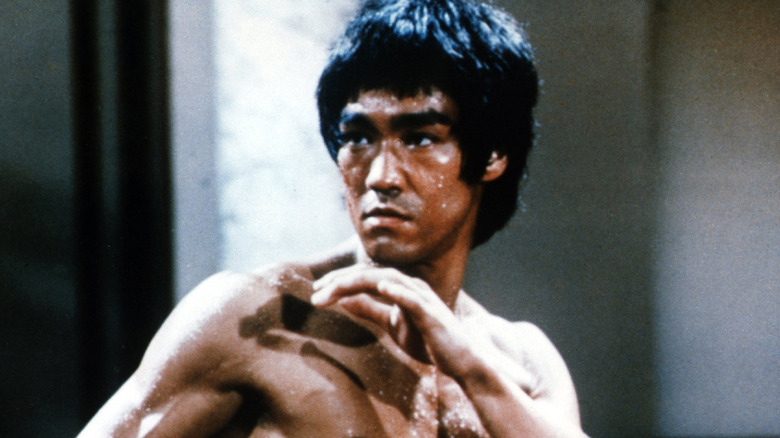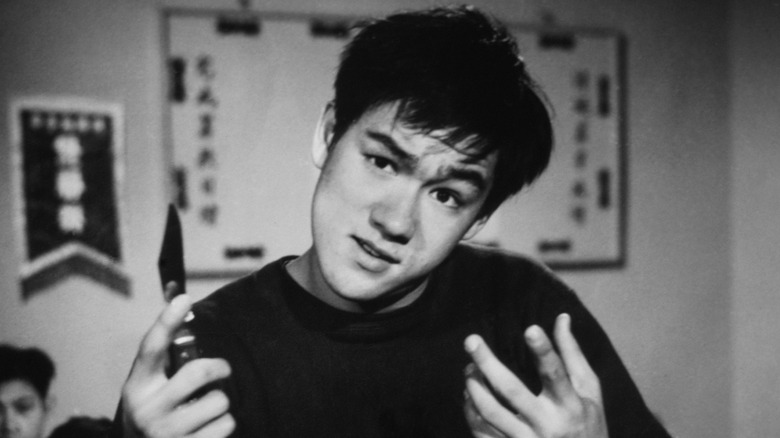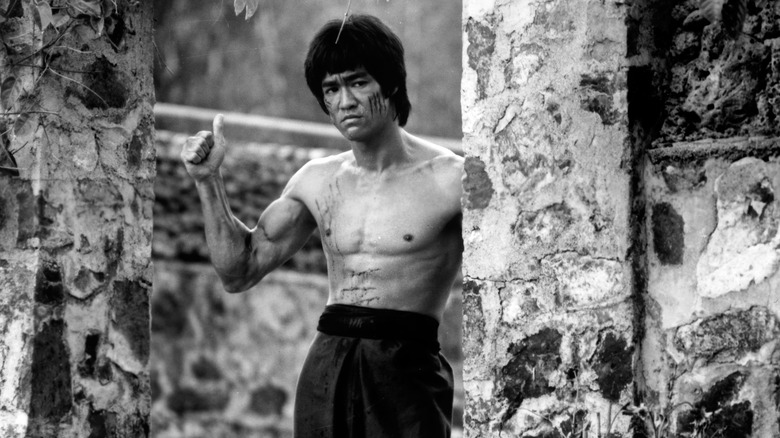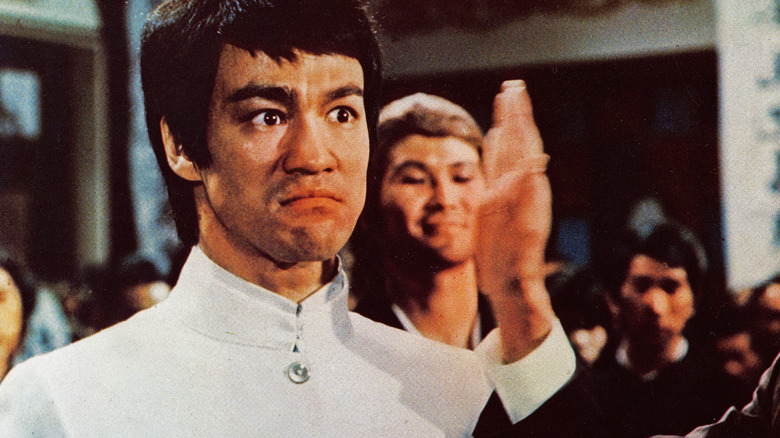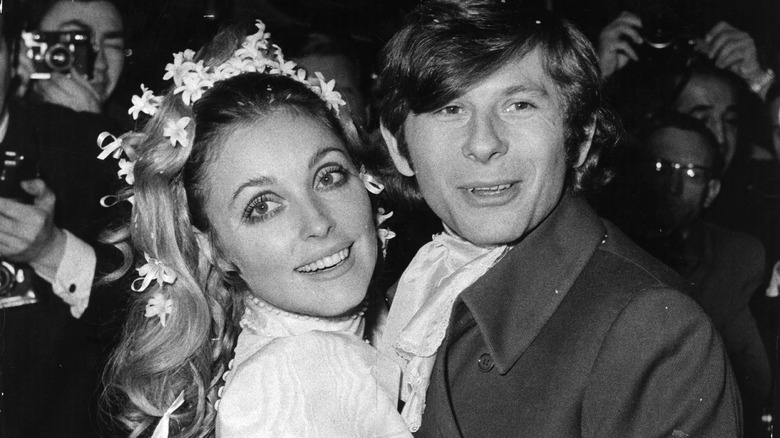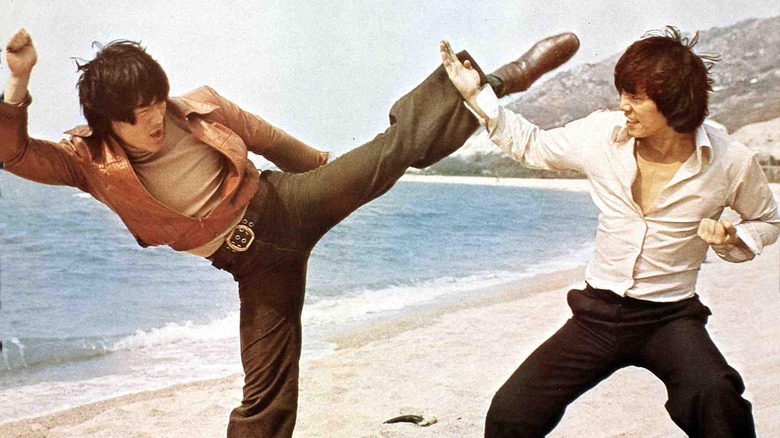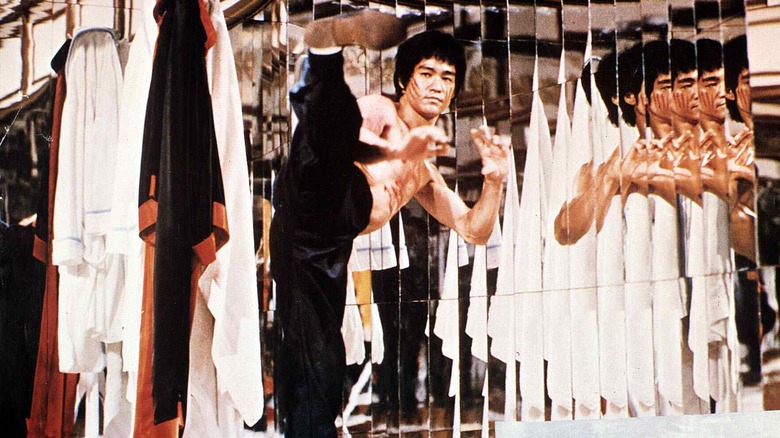8 Saddest Things About Bruce Lee's Life
Movie star Bruce Lee had a career so monumental that he is often credited with popularizing martial arts films. The late "Enter The Dragon" actor began learning Wing Chun style kung fu at only 13 years old. He went on to teach classes himself while advancing his acting career. Lee had made a name for himself by the 1970s and likely would have gone on to rack up many more accomplishments had he not tragically passed away at 32 years old.
Lee was known for his many inspirational quotes, and his words still resonate with people years after his death. The actor's daughter, Shannon Lee, revealed to Variety that she's moved by her father's knowledge. She also shared that his words helped her cope with the passing of her brother, Brandon Lee. "His words are timeless, really, and I just feel like when I read his words, I feel soothed," she said. "I feel hopeful. I feel energized. Those are all things that we will always need and, in some ways, now more than ever."
You might already know that Bruce Lee's son, Brandon Lee, died in 1993 on the set of the movie "The Crow" after being shot with a prop gun containing real bullets. However, this is only one of many tragedies the Lee family has experienced. Here are 8 of the saddest things about Bruce Lee's life.
Bruce Lee was bullied by his peers
Bruce Lee was born in San Francisco, California, but raised in Hong Kong. His father, Lee Hoi-chuen, was a Chinese opera singer and actor. Lee was raised in a moderately well-off family as a result. The star may not have struggled financially in the early years of his life, but he faced a few other challenges. Believe it or not, Lee wasn't a favorite among a few of his peers. He was bullied by a number of English boys who had relocated to Hong Kong with their families.
It seems that Lee wasn't the type to avoid confrontation, though, because he fought back and it eventually got him in trouble. The star admitted that he sometimes even sought danger. He formed a street gang by the name of Junction Street Eight Tigers. "I was a punk and went looking for fights," he told Black Belt magazine in a 1967 interview (via Newsweek). "We used chains and pens with knives hidden inside. Then, one day, I wondered what would happen if I didn't have my gang behind me if I got into a fight."
Members of Lee's gang were once caught shoplifting and he was brought in by police due to his association with the thieves. The actor cleaned up his act after a bully attacked him using kung fu. Lee reportedly decided to begin learning Wing Chun-style kung fu after the incident.
His sister once held him underwater, leading to a lifelong fear
A fight between siblings took a dark turn after Bruce Lee's sister, Phoebe Lee, held the star underwater. Bruce's martial arts skills are so impressive that you might assume he's quite the athlete in all other areas as well, but it turns out that this incident was so traumatic that he never even learned how to swim. Phoebe told this story during an interview with SPH Razor in 2013.
Phoebe explained that she and Bruce were teasing one another while playing in the water. She held him under and he attempted to get revenge once he resurfaced. "I pulled him under the water he was [drinking] a lot of water," she said. "He beat me up [and started] chasing me. My mother said 'No! Don't bully your sister." It appears that the siblings didn't intend to seriously hurt one another, but the incident likely had a lasting effect on Bruce given he continued to stay away from water as an adult.
Phoebe and Bruce's brother, Robert Lee, went on to share that their famous sibling also never learned how to ride a bike. Perhaps this is because he chose to prioritize his strengths. "It just proves ... he knew his limitations," Robert said in the same interview. "He knew what he could do, what he should do, and what not to do."
He was rejected from the military due to various physical ailments
With Bruce Lee's incredible physical strength and endurance, it's hard to imagine that he would ever be rejected from the military. However, that's exactly what happened to the star. Lee was drafted in 1963 but unfortunately didn't meet the U.S. Army's physical requirements. The "Fist of Fury" actor allegedly had an undescended testicle and a sinus disorder. It was also relatively well known that Lee had to wear glasses and contacts due to poor eyesight.
Lee didn't let these physical challenges stop him from achieving great things. In fact, his poor eyesight indirectly led him to master Wing-Chun kung fu. An excerpt from "Zen In The Martial Arts" by author Joe Hyams includes Lee's thoughts on how he worked around his poor eyesight. "Since childhood I have been near-sighted, which meant that when I wasn't wearing glasses, I had difficulty seeing an opponent when he wasn't up close," he said, according to the book. "I originally started Wing-Chun because it is an ideal technique for close-in fighting."
Bruce Lee's college girlfriend rejected his proposal
One of Bruce Lee's first relationships ended in heartbreak. Lee's first love was Amy Sanbo. She came from a different cultural background than Lee and spent much of her life in a Japanese-American internment camp. Lee reportedly proposed to Sanbo numerous times, but she rejected him.
It appears that the couple was very much in love even though they didn't work out in the end. Director Bao Nguyen spoke to Sanbo about the relationship while making the 2020 "Be Water" documentary about Lee's life. "We spoke to Amy Sanbo, his first girlfriend in America, who broke his heart," he told GQ. "Hearing about a Bruce who was heartbroken and vulnerable, trying to find his way — you just don't think of Bruce Lee that way. She talked about how he was a little awkward romantically and kind of nerdy."
Nguyen went on to share that Lee learned a lot from Sanbo throughout their relationship. "Speaking to Amy was really enlightening," the director continued. "She's Japanese-American ... During Bruce's first couple of years in America, he felt lost between his Hong Kong side and the new identity he was trying to form as an American. Amy was the one who showed him the beauty and power of being Asian-American, and that resonated with him and informed him for the rest of his life."
The star was accused of being involved in Sharon Tate's murder
Before Charles Manson's followers were identified as Sharon Tate's killers, Roman Polanski thought Bruce Lee was the murderer. This shocking revelation came to light in Polanski's memoir, "Roman by Polanski." Tate, her husband Polanski, and Lee all became friends after Tate and Lee met on the set of "The Wrecking Crew."
While investigators worked toward finding Tate's killers, Polanski began his own investigation into Lee. Glasses were found at the crime scene and the film director suspected Lee was the culprit because he revealed during a kung fu class that he had recently lost his glasses. Polanski then offered to drive the actor to his optometrist to replace his glasses. He secretly planned to compare his prescription to the prescription of the glasses found at the crime scene. Of course, Polanski ultimately found out that the prescriptions didn't match.
Lee's biographer, Matthew Polly, gave further insight into why Polanski was so suspicious of Lee during an interview with Esquire. "Bruce was the only person [Polanski] knew personally who had the physical skills to hurt a bunch of people at once," Polly said. "Bruce was the toughest guy he knew, and Bruce knew weapons."
A back injury almost ended Bruce Lee's career
Bruce Lee's martial arts movies have gone down as some of the greatest of all time. These career-defining roles introduced the genre to the mainstream and propelled Lee to stardom even after his passing, but he endured a lot in his journey to reach this level. According to the official website run by Lee's family, he suffered a back injury while training in 1969. He damaged his sacral nerve so severely that he was told he would never be able to practice martial arts again.
Of course, this threatened his career. How could Lee make a name for himself if he could no longer take on roles in martial arts movies? The "Game of Death" actor seemingly refused to let go of his dreams because he developed a plan to recover from his injury. Lee's website reveals that he took time to research how to heal his body. He also wrote for much of this recovery period given he had lots of downtime. "Whether I like it or not, circumstances are thrust upon me, and being a fighter at heart, I sort of fight it in the beginning," he once penned, adding, "But soon realize that what I need is not inner resistance and needless conflict, rather by joining forces to readjust, I need to make the best of it. Walk on and leave behind all the things that would dam up the inlet or clog the outlet of experience."
Bruce Lee's tragic death
Bruce Lee died of a brain edema July 20, 1973. The actor was only 32 years old at the time. His death took place just weeks before the release date of the movie, "Enter the Dragon," which later became his most famous film. The actor had experienced a health scare during the filming process that foreshadowed the illness that killed him. He passed out on May 10, 1973, and was later diagnosed with cerebral edema.
According to Healthline, cerebral edema is a build-up of fluid in the brain that can result in death when left untreated or treated too late. Lee was given medication to reduce the fluid buildup and later sent home. He later experienced that second episode that ultimately took his life. Because the star was so young at the time of his death, conspiracy theorists threw out a number of other possible reasons for his passing. Some guessed that he died of heat stroke, and others speculated that he was poisoned by his mistress.
New possible information on Lee's death came to light in 2022. A study conducted by the Clinical Kidney Journal speculated that the star's death had to do with poor kidney function. "We hypothesize that Bruce Lee died from a specific form of kidney dysfunction: the inability to excrete enough water to maintain water homeostasis," the study states in part. "This may lead to hyponatraemia, cerebral oedema and death within hours if excess water intake is not matched by water excretion in urine."

